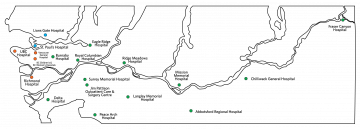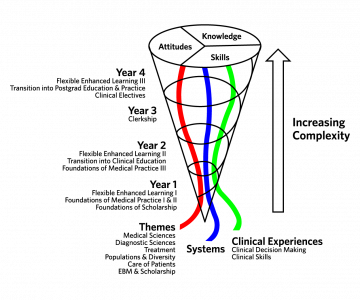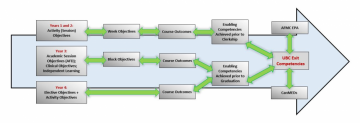About the FoM & MDUP
Thank you for all you do for our region and students!
Faculty of Medicine (FoM)
Facts & Figures

We respectfully acknowledge that the UBC Vancouver-Fraser Medical Program (VFMP) is located on the traditional, ancestral, unceded territories of the xʷməθkʷəy̓əm (Musqueam), Skwxwú7mesh (Squamish), səl̓ilwətaɁɬ (Tsleil-Waututh), Kwantlen, sc̓əwaθenaɁɬ təməxʷ (Tsawwassen), S’ólh Téméxw (Stó:lō), Hul’qumi’num Treaty Group, kʷikʷəƛ̓əm, Stz’uminus, Qayqayt, sq̓əc̓iy̓aɁɬ təməxʷ (Katzie), Semiahmoo, Á,LENENEC LTE (W̱SÁNEĆ), Nłeʔkepmx Tmíxʷ (Nlaka’pamux), Quw’utsun, Nuxwsa’7aq (Nooksack), and the Cayuse, Umatilla and Walla Walla people whose historical relationships with the land continue to this day.
The UBC Faculty of Medicine across the province consists of:
- 657 full time faculty
- 10,483 clinical faculty
- 2000+ staff
- 4500+ trainees
- 288 MD undergraduates (x4)
- 80+ training sites
- >70 residency programs
- 475 Masters + PhD students
Visit the UBC Faculty of Medicine site to learn more Facts & Figures.
Leadership & Administration
| Dean | Faculty of Medicine and Vice-President, Health |
| Vice Deans | Academic, Education, Health Engagement, Research |
| Regional Associate Deans | Interior, Northern British Columbia, Vancouver-Fraser, Vancouver Island |
| Associate Deans | Continuing Professional Development, Faculty Development, Fraser, Graduate and Postdoctoral Education, Health Professions, Postgraduate Medical Education, Student Affairs, Undergraduate Medical Education (UGME) Program |
| Assistant Deans | Admissions, MD Undergraduate Program, Postgraduate Medical Education, Vancouver Fraser Medical Program, Island Medical, Program, Northern Medical Program, Southern Medical Program, Student Affairs x6 |
| Academic Program Directors | Medical Laboratory Science Program, Midwifery Program, Clinical Faculty Affairs x2 |
| Centre & Institute Directors | Academic Programs, Centre & Institutes, Schools |
| Associate Deans, Research | BC Cancer Agency (BCCA), BC Children’s Hospial Research Institute (BCCHRI), Providence Health Care Research Institute (PHCRI), Vancouver Coastal Health Research Institute (VCHRI) |
Note that each department will have its own structure with their own administrative faculty and contacts.
Visit the UBC Faculty of Medicine site for more details on Academic Administration.
Service Units
- Communications
- IT
- Finance
- Room Booking
- Facilities
- Purchasing
- Health & Safety
Visit the UBC Faculty of Medicine site to access each Service Unit.
MD Undergraduate Program (MDUP)
The program is organised by Systems and Themes that are structured through a Spiral Curriculum that lead students to Exit Competencies.
Curriculum
Systems
A system is a group of organs or functional collections of tissue that work together to maintain homeostasis. A system does not work in isolation, and the well-being of the person depends upon the well-being of all the interacting systems. Systems are championed by System Leads.
Themes
Themes are specific areas or categories of knowledge, skills, and attitudes that support undergraduate medical education at UBC. They are supported and addressed by a focus in the curriculum over all 4 years, as appropriate. Themes are championed by Theme Leads.
Visit this document to view System & Theme Leads. For further information, please contact Dr. Adrian Yee, Director of Curriculum at adrian.yee@ubc.ca.
Spiral Curriculum
In August of 2015, the UBC MD Undergraduate Program launched a renewed curriculum. Based on longitudinal learning, the traditional smaller blocks of material that have historically dominated the medical curriculum have been reshaped into “spirals” of integrated Themes, Systems and Clinical Experiences that will recur across all four years. Material taught in the foundational sciences such as anatomy, histology, physiology and genetics have been resurrected, at increasing levels of complexity, across all four years, while simulation exercises and immersion into clinical contexts are introduced right from the first year.

Visit the UBC Faculty of Medicine site to learn more about the Spiral Curriculum across Years 1-4.
How do I search the Curriculum?
All learning activities (e.g. lectures, labs, case-based learning modules etc) are mapped to course/session objectives and tracked through the Curriculum Management Unit (CMU). You can use the CMU to find out where specific topics are taught in the curriculum.
The Curriculum Management Unit (CMU) maintains an accurate and up-to-date curriculum management system (Entrada). All faculty can access Entrada with their Campus-Wide Login (CWL) to search MD Undergraduate Program (MDUP) curricular content. Contact your designated site coordinator to obtain a CWL account.
Assessments
The MD Undergraduate Program (MDUP) follows a model of programmatic assessment, relying on multiple low-stakes assessment points to inform promotion decisions. These assessment points include:
- Written Exams
- Work-place Based Assessments (WBAs)
- Objective Structured Clinical Examinations (OSCEs)
- Portfolios
Exit Competencies

Visit the UBC Faculty of Medicine site to learn more about the MD Program Goals and Exit Competencies.
Have more questions?
Reach out to us at vfmp.facdev@ubc.ca.